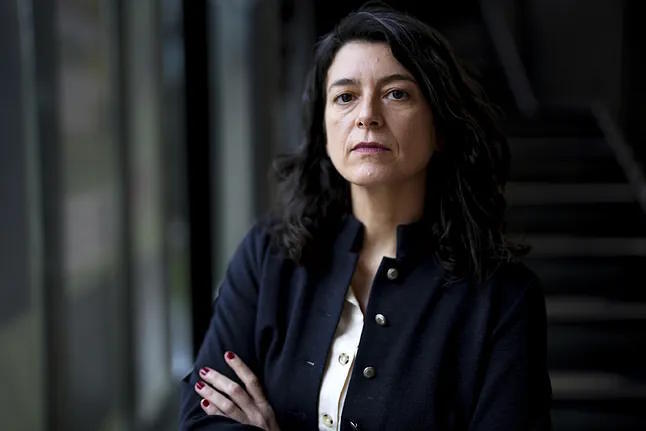Such is the case with the six stories that make up El buen mal (Seix Barral), a new display of the exceptional talent of the writer to calibrate and elevate those small twists that make the ordinary and magical, and that justify the wait. Alongside her classic themes such as the boundaries between the ordinary and the strange, loneliness, fear and its ramifications, or communication problems, here are added death and its consequences, existential nihilism, guilt and family, or care.
"I am interested in exploring the invisible forces that govern our lives, our fears, the stories we tell ourselves about ourselves, the mandates we live by, the cultures we grow up in, and the ideas we have about the world," explains Schweblin, whose literature revolves around a question: "What happens when something strange intrudes into our lives, shakes our certainties, and awakens us from all that we considered stable and true?" she summarizes.
Disturbing, absorbing, and ambiguous, the author's stories directly target human emotions, which she considers a key element of literature. "A story is simply a series of extremely specific commands that lead a reader, through 20 pages, to a specific emotion. Rebecca Solnit says that a great book is a heart beating in another's chest, and I subscribe to that idea," states Schweblin, who affirms that when we read, "we are constantly forming prejudices, good and bad, anticipating and trying to understand."
"Fiction is a struggle against the senselessness of a present in which we no longer have any certainties."
"And in those judgments are you with all your fears, problems, denials, thoughts... When the text puts you on edge, in a state of alarm, and you can't explain what is happening, all you want is to know, and that's when you truly listen and understand what really matters to you, what truly terrifies you. That's where the magic happens," elaborates the Argentine about her way of narrating, which she considers, despite the labels of dreamlike, fantastic, or terror, as eminently realistic. "These are genres that I read with devotion, and some of my great masters are there, but it's not what I write. I move in a carefully realistic world, and it's the imminence, the possibility of the monstrous happening, even if it never does, that fascinates me."
An unsuccessful suicide attempt, a phone call to relive the accident in which a child died, the fear of losing a loved one, the distance between a father and a son after a fateful accident, an attempt at care that ends in tragedy, and another good deed that ends in a harsh threat are the plots unfolding in stories that, for Schweblin, encapsulate "a struggle against the senselessness of a present in which we no longer have any certainties. We are, as individuals and as a society, in a terrifying and very vulnerable moment, where all the things we thought and took for granted socially suddenly crumble," reflects the author. "That's why literature, which is a dress rehearsal for life, a way to anticipate what could happen, can help us try to understand how other possible worlds would be, how much they would hurt, and if we would be able to survive them."
Despite this complete amendment to the ordinary and "normality" that is her literature, Schweblin understands why humans surrender to it, as she acknowledges that "it is a convention that allows us to live. What normality brings is the great sedative of automatism, and ultimately, we all surrender to that. If we had to truly think carefully about everything we do during the day, life would be complete madness," the writer laughs. "The fact that there is a consensus on what is right and wrong, what can and cannot be done, or what the limits are, calms us, soothes us, and organizes us. But the paradox is that it also ends up being the cage in which we are trapped," especially, she points out, when the current reality begins to take on a sense of strangeness. "Although it won't be because we weren't warned," she adds.
"Literature is a dress rehearsal for life, a way to anticipate what could happen."
"When I arrived in Germany about 12 years ago, they told me that every two weekends the Nazis would march past my apartment and that, on the other hand, pro-Palestine demonstrations were completely prohibited," shares the writer, who has been teaching Creative Writing classes in the German capital for over a decade. "Impossible, I thought. This can't happen, not in Germany, in a culture that has been saying for decades, 'Let's be good, this won't happen again.' But it was happening, and now we are reaping the consequences," she reflects.
Positioned at the absolute antipode of political literature, Schweblin cannot help but think of her country, which she visits frequently and where her family resides. Through it, she issues a stark warning: "What is happening in Argentina is horrible, very unjust, violent, and devastating. And it is the future. It seems like a horrible joke, but if you want to know what will happen in a year in many places around the world where politicians similar to Milei are gaining strength, just look at Argentina. And, unfortunately, it's not a pleasant vision," she laments.
